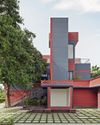
Having finished my graduation from the Chandigarh College of Architecture, I had come to Delhi after securing a job with the prestigious firm of Joseph Allen Stein & Associates. The office at Sunder Nagar on Mathura Road, adjacent to Delhi’s Zoological Park or Chidiya Ghar, was very close to the ruins of the hoary Purana Quila. This lent to the surroundings a sense of timelessness and tranquillity and a reflective ambience. Stein was a man of immense imagination, a sense of history, and great respect for India’s cultural heritage. A born teacher, he had a lot of compassion and encouragement for young architects, and was thus the perfect mentor to begin one’s career with.
He would encourage the young architects of his office to wander through the city’s historic monuments and ruins, attend lectures and also visit new and upcoming projects in the city. Along with this discovery of India’s past, a new exciting churn in the present too was happening. To discover talent for prestigious new projects, big-banner architectural competitions were being held very often. The one to hit the headlines in a big way at the time was the design for the Hall of Nations and Halls of States project, won by architect Raj Rewal, to be built at Pragati Maidan for the International Trade Fair in 1972. During lunch hours, we young architects would often go there, to see the innovative architectural designs coming up. Inspirational, ground-breaking concepts for pavilions by bright, young Indian architects were taking shape. The Hall of Nations had a unique structural system of cast in situ concrete space frame, first-ever attempted in India. The huge 6,700 sq m area of a clear span hall, shaped like a giant truncated pyramid, was structurally designed by a brilliant engineer named Mahendra Raj, who too got great attention.
This story is from the June 2022 edition of Architecture + Design.
Start your 7-day Magzter GOLD free trial to access thousands of curated premium stories, and 9,000+ magazines and newspapers.
Already a subscriber ? Sign In
This story is from the June 2022 edition of Architecture + Design.
Start your 7-day Magzter GOLD free trial to access thousands of curated premium stories, and 9,000+ magazines and newspapers.
Already a subscriber? Sign In

A GRECIAN RETREAT
Shimona Bhansali imbues a subtle touch of opulence to this home in Mumbai

A BOLD STATEMENT
Dhampur Sugar Mills Limited's workspace in New Delhi designed and built by Officebanao adopts an industrial narrative

A BREATH OF FRAGRANT DESIGN IN DELHI'S HEART
An office that smells like perfumery; that is the vision that TWI brought to life in this office space designed for an acclaimed perfume company in India

MASTER OF ALL TRADES
The ethos of forward-thinking and ingenuity finds its architectural counterpart within the walls of Nikhil Kamath and Abhijeet Pai's office-a vision of organic design infused with the essence of India

A TOUCH OF OPULENCE
Designed by Aparna Kaushik, this Delhi office displays an interesting balance of classic aesthetics and contemporary sensibilities

THE WOODEN WONDERLAND
Priyanka and Piyush Mehra envision a stunning experience centre for Vikas Plywood

THE HUB: BUILDING COMMUNITIES
Studio Lotus designs a dynamic mixed-use community hub that activates Chennai's largest IT Park

THE WINNER'S PERCH
Baldiwala Edge designs a Singapore-based ship broker's office as a torch collector's paradise, offering a 360-degree bird's-eye view of the Mumbai skyline

THE DIRECTOR'S CABIN
Designed by Envisage, this office gives a new definition to the traditional notion of biophilia

Designing Corporate India
From weaving the magic of a Star Trek-themed command centre to crafting bespoke block-printed workstations, Vijaya Bhargav and Arnab Ghosh-the trailblazing co-founders of Ostraca-have astonishingly transformed a staggering 29 million square feet of office space for India's tech giants and global enterprises-all while maintaining a flat hierarchical company culture-fuelling a master class in corporate design